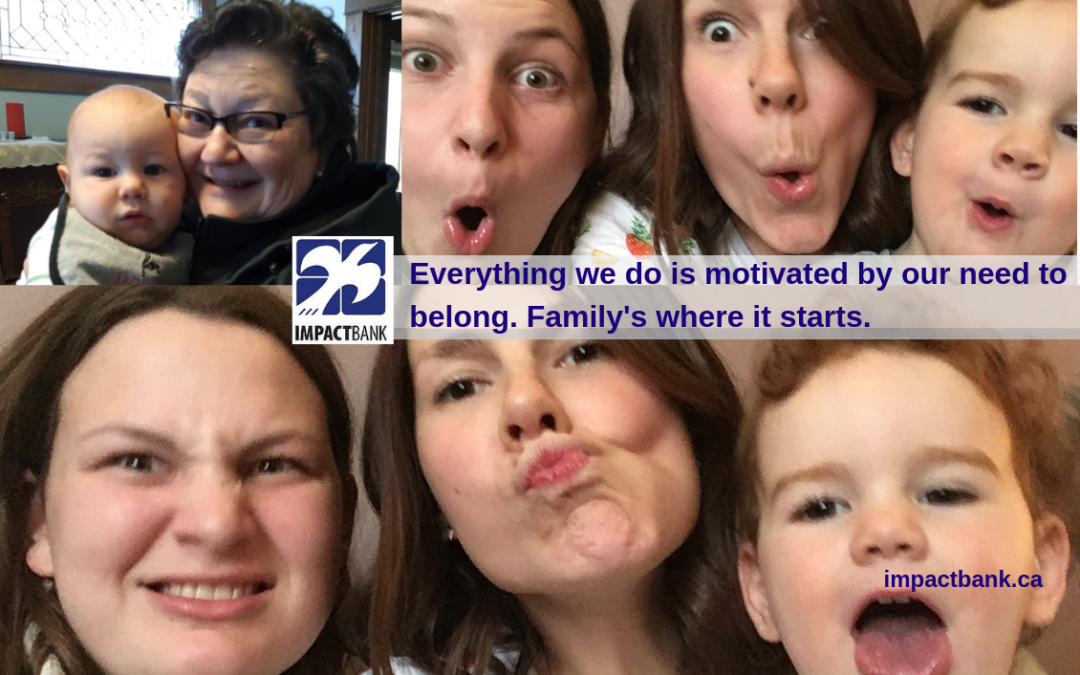Belonging motivates everything we do. To be clear, the motivator is our evolutionary need or drive to belong. Knowing we’re all driven by a deeply embedded need to belong, doing the work and consciously putting the effort into challenging our own reactions to what appears to threaten our tribe, is essential to being truly self aware and living consciously. Otherwise, we’re allowing a potentially destructive force of nature, rather than a conscious and thoughtful decision, to guide us.
This week, in the podcast episode, I explore the compulsion that is the human need to belong. This week’s newsletter examines how this need can be exploited, touching on how it can be used to radicalize. My point in the Instagram and LinkedIn Wednesday videos is how belonging creates the safety necessary to take risks and learn. As usual, this blog post is a wrap on the theme. This week I explore how belonging shows up in my Bank Your Impact system before describing the impact when belonging is threatened personally and systemically.
Belonging Defined
To belong is defined by the dictionary as an affinity to a place or situation. Interestingly, when looking further, there are additional ways, beyond the most obvious, possession. Membership is an component of belonging. Additionally, inclusion or classification. In my BYI system, I define it as motivator.
As I mention in this week’s podcast, belonging is noted by Maslow as a basic human need, just above sustenance and before esteem. Moreover, I mention my appreciation for Dan Pink’s book Drive and his assertions about motivation. The decision to make belonging one of the pillars in my system is influenced primarily by Ray Baumeister. Furthermore, Baumeister’s writing inspires me to see the movement from Maslow’s Hierarchy to the work by Pink as a developing and important story. He demonstrates how everything that every human being does is motivated, at its core, by our desperate need to belong. It’s hard wired into us. Additionally, Daniel Siegal, the well known neuro scientist, beautifully builds on Hebbs axiom, “Neurons which fire together, survive together and wire together”. We survive through connections.
Belonging in the Bank Your Impact (BYI) System
The BYI system is built on pieces of a larger puzzle. Additionally , it’s influenced by a specific request from to-be coaching clients. A couple of 30-something professionals asked me to make an exception and accept them as clients. This experiment opened my eyes to a calling, of sorts. I feel moved to build a system as foundation for reworking my practice. I’m learning and growing while supporting my new and growing client base. Then, when adding a research review, I discovered three clear benefits worth building around. Particularly beneficial, when supporting professionals at the early to middle part of the working or career stage of life. Those include: belonging, presence and resilience.
Belonging as Benefit
The benefits we experience when we feel we belong are almost incalculable. Performance in every aspect of one’s life improves. Firstly, people think more clearly. People make better decisions. More options become apparent when solving problems. People actually sleep more soundly. Perhaps it’s the lack of sleep, feeling unsafe, that results is disconnection. Nevertheless, there are many more residual benefits for individuals, families and society at large that make investing in healthy belonging worthwhile.
In my system the core components that attach to the benefit of belonging include: mindset, connections, and communication. One’s mindset is deeply influenced by their attitude and beliefs. While any one of these is a great entry point for exploration, I often find patterns or habits, both which tend to be more accessible, are a great place to start.
Belonging Skills
The BYI system isn’t solely about teaching skills. It contains models that incorporate and outline specific skills. In the area of connecting, we lean into Baumeister’s work to explore different ways of developing healthy and meaningful networks. I break down two types he describes and label them as the “touch-stone” and the “embedded”. Discussing the value of each and the skills necessary to nurture both is very useful. In the sub-categories of connections and communication, we examine the inner reaction to threats. Experienced threats often prompt barriers or cloudy thinking, even creating break downs in communication. Furthermore, the system encourages an exploration of explanatory-styles. Participants begin to see when their self-sabotage reduces or breaks feelings of belonging.
Belonging is not a skill. There are little hacks people can learn though, to connect them more appropriately and allow them to feel heard and valued in ways that ensure their mindset is healthy and capable of growing and learning. It becomes achievable when breaking it down into a few skills. By putting it into bite size chunks, without minimizing the opportunity, ensures there’s always a great opportunity to build on the learning.
Belonging Threatened
When belonging is threatened it’s devastating because it’s such a fundamental human need. Unfortunately, it happens regularly and frequently and most people are completely unaware of what’s happening to them in that moment. Most people react to the feeling and then struggle with the consequences. The BYI system is designed to prepare participants to begin noticing when they are in the midst of the feeling and eventually, with practice, learn to anticipate the experience. Furthermore, anticipation is the path to responding rather than reacting. Additionally, it may be possible to also find a fresh pathway that eliminates the threats once in a while.
While the BYI system is specifically designed for the personal threats, systemic threats are extremely problematic. We can do something about the systemic threats too. It’s a more daunting task. People see personal threats more readily and, with effort, can do something about them. Start by building agency through skill development. This is a contribution everyone can make. It is the systemic threats though, that will ultimately make the biggest difference in the world. Moreover, I believe we’ll inspire or require systemic solutions when we build a critical mass of self-aware people.
The Personal Threat
We experience everything as an individual and we don’t always relate to systems. In response, the BYI system focuses on personal growth. Today, change is driven from the bottom up. Belonging is more about the system. Self-aware individuals influence and change the system. Each individual is made up of a system, at their core. It’s helpful to play with that fact. The human body is a system. How does your body react as an interactive system, when threatened? Learning and growing is the best approach to changing the world. The first step is experimenting with your own system.
A brief story…
A perfect example of this evolved around me even while writing this post. I took a break a few hours ago to check a document related to a community where I serve in a leadership capacity. Something prompted me to look more deeply, and I discovered a significant breach of trust on the part of a vendor. I was triggered, as happens with most threats related to trust. The first sign was a cognitive reaction. I was unable to concentrate and get back to this post. My breathing was shallow and my stomach was churning. I calmed down, upon recognizing, labeling and releasing the related feelings.
My self regulation skills were diminished. I didn’t want to carrying the negative energy into an upcoming meeting, potentially impacting relationships. Knowing the potential, I briefly declared my feelings of exasperation at the outset, assuring everyone it wasn’t directed at them. The two second acknowledgment was useful. At the end of the meeting, one participant commented that he suspected I’d enjoyed a shift. He described it as exasperation moving to optimism. He’s right. I returned to a healthy feeling of belonging by recognizing, labeling, breathing deeply and declaring the sabotaging feeling openly.
The Systemic Threat
The hyper-connected nature of society exacerbates the systemic threat. I reference the van attack in Toronto in April 2018 in this week’s newsletter. A radicalized Incel man drove a van onto the sidewalk on Yonge Street, just south of Finch, targeting and killing women. He was inspired by feeling abnormal, that he doesn’t belong in society. Nevertheless, it’s less likely he’d act on these feelings, but for the fanning of his inner anxiety by a like-minded community in the dark regions of the internet. An example of the personal, fed or feuled by the systemic.
The use of algorithms and data management is another way to look at the systemic threat. We build, fuel and fan a huge systemic threat when society trusts and respects data as a sacred cow, of sorts. I’m not an expert in the data threats so if you’re interested in hearing from an expert, check out Cathy O’Neil’s book Weapons of Math Destruction: How Big Data Increases Inequality and Threatens Democracy.
Walk With Me…
In April 2018 I brushed up against a call for meaning; an insight of sorts. It ultimately moved and inspired me to shift the focus of my practice. I’m walking with 30 somethings, who are truly in a pivotal spot in life and career. Whether HERE by age or spirit, I want to walk with these seekers! Seekers who are ready to do some self exploring & find the real meaning of their life? The research suggests people embrace their inner REBEL during their 20’s while most slip quietly and comfortably into ACCOMMODATOR in their 30’s. This documented pattern grabbed my attention and my mission was made clear. Moreover, I’m intent on resurfacing that inner rebel whose perspective, now shaped with more experience, may offer insights many typically miss when they matter most.
In June 2018 I took a course in story telling. I was intent on finding my “Big Why” to help me understanding my purpose for shifting my practice. Ultimately, I landed on my story. It spans from my childhood, with a pivotal point in my early 20’s finally culminating in a significant career turning-point at the age of 37. This story revealed an unhealthy pattern while illuminating my purpose. In fact, I feel motivated when remembering the moment of insight because this transition is difficult. Ultimately though, it adds meaning to my work. Listen below…
Feel like you’re living someone else’s destiny?
Willing to do the work to find more meaning?
Once you have the skills to unpack the emotions and barriers and triggers and mindset challenges with the skills in my BYI system, you’ll begin to see the impact in your career and you’ll find what matters most to you. Join me…
My goal is to make my system accessible and affordable. There are many ways you can engage with me….below you’ll find THREE to get started, without spending a dime.
WALK WITH ME…
- REGISTER for an ASK ROX RoundTable… TWO 50 minute engagements on ZOOM – the second Tuesday and the last Friday of every month – limited to 12 participants in each.
- BOOK a complimentary exploratory conversation 20-30 minutes.
- SUBSCRIBE to my mailing list from my home page, receive an interactive exercise helping you cope with stress, and a weekly reflection.
Of course I’d love to work with you, your team or organization so…
- Book me to speak at your conference or to a group in your organization. My workshops on building resilience, improving relationships, and increasing performance are popular.


